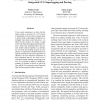Free Online Productivity Tools
i2Speak
i2Symbol
i2OCR
iTex2Img
iWeb2Print
iWeb2Shot
i2Type
iPdf2Split
iPdf2Merge
i2Bopomofo
i2Arabic
i2Style
i2Image
i2PDF
iLatex2Rtf
Sci2ools
ACL
2011
2011
A Comparison of Loopy Belief Propagation and Dual Decomposition for Integrated CCG Supertagging and Parsing
Via an oracle experiment, we show that the upper bound on accuracy of a CCG parser is significantly lowered when its search space is pruned using a supertagger, though the supertagger also prunes many bad parses. Inspired by this analysis, we design a single model with both supertagging and parsing features, rather than separating them into distinct models chained together in a pipeline. To overcome the resulting increase in complexity, we experiment with both belief propagation and dual decomposition approaches to inference, the first empirical comparison of these algorithms that we are aware of on a structured natural language processing problem. On CCGbank we achieve a labelled dependency F-measure of 88.8% on gold POS tags, and 86.7% on automatic part-of-speeoch tags, the best reported results for this task.
ACL 2011 | Belief Propagation | Computational Linguistics | Dual Decomposition | Natural Language Processing |
| Added | 23 Aug 2011 |
| Updated | 23 Aug 2011 |
| Type | Journal |
| Year | 2011 |
| Where | ACL |
| Authors | Michael Auli, Adam Lopez |
Comments (0)

